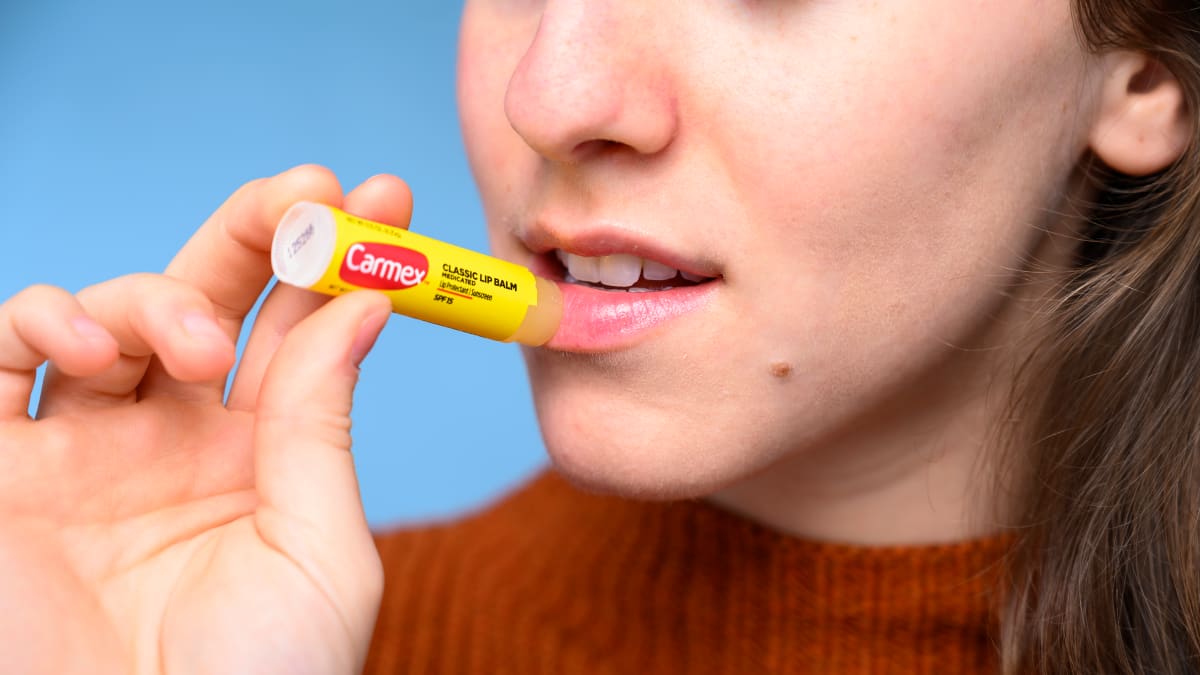Does Carmex Burn Your Lips? The Ultimate Guide To Soothe Your Lip Concerns
Hey there, friends! Let's dive straight into a burning question—literally! Does Carmex burn your lips? If you're here, chances are you’ve experienced that tingling sensation after applying this popular lip balm. But why does it happen, and more importantly, is it harmful? Grab a cup of coffee, or maybe a soothing chamomile tea, because we’re about to uncover everything you need to know about Carmex and your lips. Spoiler alert: It’s not all bad news!
Lip care is no joke, folks. Carmex has been a go-to remedy for dry, chapped lips for decades. But with great power comes great responsibility—or in this case, a tingly sensation. Many users report a slight burning or stinging feeling after applying Carmex, especially if their lips are already irritated. So, what’s the deal? Is Carmex the villain here, or are we misunderstanding its intentions?
In this article, we’ll explore the science behind Carmex, its ingredients, and why it might cause that burning sensation. We’ll also discuss ways to minimize discomfort and alternative options if Carmex isn’t your cup of tea. Stick around, because by the end of this, you’ll be an expert on all things Carmex—and maybe even a little less worried about that pesky lip burn!
Read also:Unleash Your Dreams With Yume Wo Katare Ndash A Journey Into The World Of Dreams And Aspirations
Does Carmex Burn Your Lips? Understanding the Ingredients
Alright, let’s break it down. Carmex is packed with a bunch of active ingredients that work together to heal and protect your lips. But some of these ingredients can be a bit aggressive, especially if your lips are already in rough shape. Here’s a quick rundown of what’s inside Carmex and why it might cause that burning sensation:
- Menthol: This is the big player when it comes to that tingling sensation. Menthol creates a cooling effect, but it can also irritate sensitive skin.
- Eucalyptus Oil: Another cooling agent, eucalyptus oil can be great for soothing, but it might sting if your lips are cracked or inflamed.
- Camphor: Camphor is used to relieve pain and itching, but it can also cause a burning sensation in some people.
- Beeswax and Mineral Oil: These are the moisturizing powerhouses in Carmex, but they don’t contribute to the burning feeling.
So, if your lips are already dry or cracked, these ingredients can make things feel worse before they get better. Think of it like applying a Band-Aid to a cut—it might sting a little, but it’s doing its job!
Why Do Some People Experience Burning While Others Don’t?
Not everyone has the same reaction to Carmex, and that’s totally normal. Skin sensitivity varies from person to person, and what works for one might not work for another. Here are a few reasons why some people experience burning while others don’t:
- Existing Lip Conditions: If your lips are already irritated, cracked, or sunburned, Carmex might feel more intense.
- Product Sensitivity: Some people have sensitive skin and might react to certain ingredients in Carmex.
- Application Technique: Applying too much product or rubbing it in too aggressively can increase the burning sensation.
It’s all about finding what works for you. If Carmex feels too intense, there are plenty of other options out there. But don’t give up just yet—let’s explore some tips to make the experience more comfortable.
How to Minimize the Burning Sensation
Now that we know why Carmex might burn, let’s talk about how to make it more tolerable. Here are a few tips to help you use Carmex without the discomfort:
- Exfoliate Gently: Before applying Carmex, try exfoliating your lips with a soft toothbrush or a lip scrub to remove dead skin.
- Apply Sparingly: A little goes a long way. Start with a small amount and build up as needed.
- Use a Base Layer: Apply a thin layer of plain petroleum jelly before using Carmex to create a protective barrier.
- Avoid Overuse: While Carmex can be great for healing, overusing it might lead to irritation. Stick to a couple of applications per day.
By following these tips, you can enjoy the benefits of Carmex without the burn. But if the discomfort persists, it might be time to try something else.
Read also:Ash Armand The Rise Of A Fitness Icon And Lifestyle Guru
Alternative Lip Balms for Sensitive Skin
If Carmex isn’t your thing, don’t worry—there are plenty of other lip balms out there. Here are a few alternatives that might be gentler on your lips:
- Blistex Medicated Lip Balm: Similar to Carmex but with a milder formula.
- ChapStick Classic: A simple, no-frills option that’s great for everyday use.
- Burt’s Bees Beeswax Lip Balm: Made with natural ingredients, this balm is perfect for sensitive skin.
- Vaseline Lip Therapy: A hydrating option that’s free from fragrances and harsh chemicals.
Experiment with different products to find the one that works best for you. Remember, everyone’s skin is different, so what works for one person might not work for another.
Does Carmex Burn Your Lips? The Science Behind It
Let’s dive a little deeper into the science behind Carmex and why it might cause that burning sensation. It all comes down to the ingredients and how they interact with your skin. Here’s a quick breakdown:
Menthol, eucalyptus oil, and camphor are all known for their cooling and soothing effects. However, these ingredients can also cause a temporary burning sensation, especially if your lips are already irritated. This is because they stimulate nerve endings in the skin, which can feel uncomfortable at first.
But here’s the good news: this sensation usually subsides after a few minutes, and the healing benefits kick in. Carmex is designed to provide long-lasting relief for dry, chapped lips, so if you can tough it out through the initial burn, you’ll likely see positive results.
Is Carmex Safe to Use?
Now, let’s address the elephant in the room: Is Carmex safe to use? The short answer is yes, but with a few caveats. Carmex is FDA-approved and widely regarded as safe for most people. However, if you have sensitive skin or certain allergies, it might not be the best choice for you.
If you experience persistent burning, redness, or swelling after using Carmex, it’s a good idea to discontinue use and consult a dermatologist. They can help determine if you’re allergic to any of the ingredients or if there’s another underlying issue.
Common Side Effects of Carmex
While Carmex is generally safe, some people might experience side effects. Here are a few to watch out for:
- Burning or Stinging Sensation: This is the most common side effect and usually subsides after a few minutes.
- Redness or Irritation: If your lips become red or irritated, it might be a sign of an allergic reaction.
- Swelling: If your lips swell after using Carmex, stop using it immediately and seek medical advice.
Remember, it’s always better to err on the side of caution. If something doesn’t feel right, trust your instincts and consult a professional.
How to Choose the Right Lip Balm for You
With so many lip balms on the market, how do you know which one is right for you? Here are a few factors to consider:
- Ingredients: Look for products with natural, soothing ingredients like beeswax, shea butter, and coconut oil.
- SPF Protection: If you spend a lot of time outdoors, choose a lip balm with SPF to protect against sun damage.
- Scent and Flavor: Some people prefer unscented, unflavored options, while others like a little extra flair. It’s all about personal preference.
- Price: You don’t have to break the bank for a good lip balm. There are plenty of affordable options that work just as well as the high-end ones.
Ultimately, the best lip balm for you is the one that feels good on your lips and addresses your specific needs. Don’t be afraid to try a few different options until you find the perfect match.
Does Carmex Burn Your Lips? Final Thoughts
So, does Carmex burn your lips? The answer is yes, but only for some people and only temporarily. The burning sensation is usually caused by the active ingredients in Carmex, which are designed to heal and protect your lips. While it might feel uncomfortable at first, the benefits often outweigh the initial discomfort.
But if the burning sensation is too much for you, there are plenty of other lip balms to choose from. Experiment with different products until you find the one that works best for your skin type and lifestyle.
And remember, taking care of your lips is just as important as taking care of the rest of your skin. Stay hydrated, exfoliate regularly, and don’t forget to protect your lips from the sun. Your lips will thank you!
Call to Action
What are your thoughts on Carmex? Have you experienced the burning sensation, or is it a non-issue for you? Let us know in the comments below! And if you found this article helpful, don’t forget to share it with your friends and family. Happy lip-loving, everyone!
References
Here are a few sources I used to gather information for this article:
Table of Contents
- Introduction
- Understanding the Ingredients
- Why Do Some People Experience Burning?
- How to Minimize the Burning Sensation
- Alternative Lip Balms for Sensitive Skin
- The Science Behind It
- Is Carmex Safe to Use?
- Common Side Effects
- How to Choose the Right Lip Balm
- Final Thoughts


